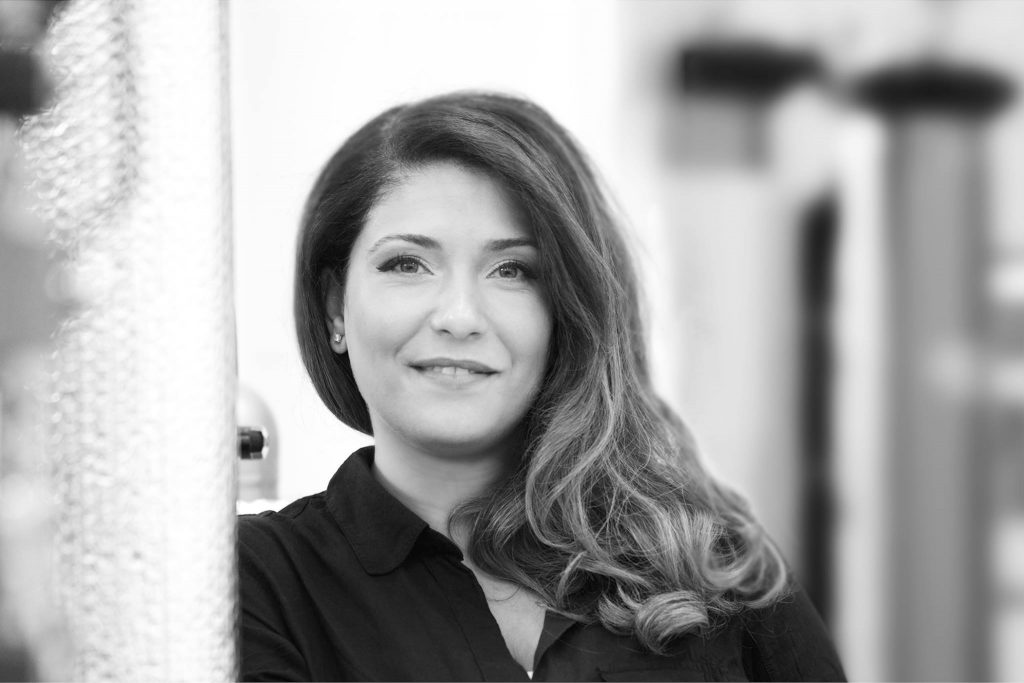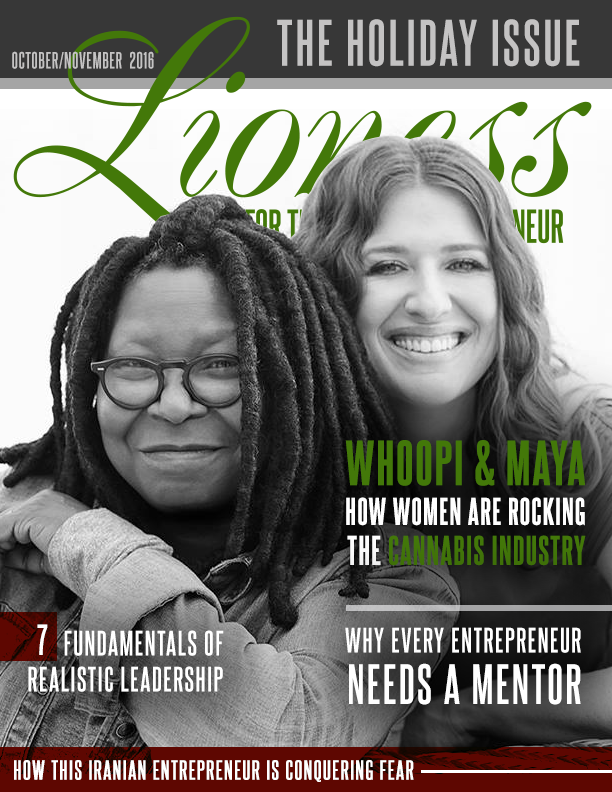Cannabis is one of the fastest-growing industries in the U.S., so it should be no surprise that as female entrepreneurship skyrockets, so does our place in this $7.1 billion market. This November, voters in California, Maine, Massachusetts and Nevada voted in favor of legalizing recreational use of marijuana. They join four other states and the District of Columbia.
For women like Salwa Ibrahim, it’s an opportunity to dominate the marketplace. Women hold more leadership roles in the cannabis industry, than any other industry, according to Marijuana Business Daily. As executive director of Blüm, a dispensary, with a location in Oakland, Calif, two in Las Vegas and two more under construction, Ibrahim has been working with those who use marijuana for medical purposes for years. Blüm currently has approximately 65 employees and is on course to do $16 million in revenue by the end of 2016. Their first location, Blüm Oakland, opened in 2012. When she chatted with Lioness this summer, prior to the recreational legislation passing, she said she worked diligently as a liaison between the dispensary and the city to make sure they are always compliant.
“It’s one of the key factors. You want to remain compliant within the rules and framework set for you. I’m in charge of expansion and my expertise is in the application process and responding to RFPs for our industry. We have a stellar record and are ranked in the top 10 in every jurisdiction we’ve applied in and we’ve gotten every permit we’ve applied for,” Ibrahim said.
Blüm offers a wide selection of products, including a variety of mid and high grade flowers (the part of the marijuana plant that is smoked), to edibles and topicals. On an average visit their customer spends $50-$54 on flowers, though Ibrahim said now that the concentrate market has picked up, it makes up 25 percent of their business.
Nicknamed Oakstadam, the city of Oakland is the pioneer of the marijuana movement. It was the first city in the United States of America to license medical marijuana dispensaries in 2010. When Ibrahim got started, women weren’t as comfortable working in this space. There were times when dispensaries were raided by the DEA, despite the protests of some local officials, and Ibrahim said there were even instances of children being removed from homes by Child Protective Services.
But things are quickly changing. “Thank God for organizations like Women Grow,” Ibrahim said.
Founded in 2014 in Denver, Colorado, Women Grow serves as a catalyst for women to influence and succeed in the cannabis industry as the end of marijuana prohibition occurs on a national scale. It’s the largest professional networking organization in the industry with a community of more than 20,000 professionals in 45 cities across the U.S. and Canada. More than 70 percent of their network is comprised of women who have access to monthly networking, a vetted business referral system, mentoring and educational programming.

photo courtesy of Terra Tech Corp
As women get together to launch ideas, many are creating products exclusively for women. Maya Elisabeth has been working with cannabis for years. During her college days when she juggled classes and waiting tables, she used cannabis to wind down in the evenings. She found it to be a sensual experience and later went to work for a dispensary. In 2008, she founded the successful Om Edibles, an all-female run collective dedicated to providing the highest quality of medical cannabis products to legal patients in California.
It flourished beyond her wildest dreams. Om Edibles has won a category in The High Times Cannabis Cup – the world’s leading marijuana trade show – a whopping eight times. Her connection to former High Times Associate Publisher Rick Cusick led to her latest endeavor in April 2016, CEO of Whoopi & Maya, a medical marijuana company she cofounded with legendary actress Whoopi Goldberg. Goldberg was looking for the one of the most talented infusers she could find, and Elisabeth came highly recommended by Cusick.
“So we met and we got along. We had instant chemistry. I’m continuously blown away by what a role model she is and she doesn’t stand by things she doesn’t believe in,” Elisabeth said.
They created a signature line of medical cannabis products designed specifically for relief from menstrual discomfort. “It’s really painful for some women. This whole line is everything that a woman can use – from a bath soak to chocolate. It’s designed to be used together or separately,” Elisabeth said.
Whoopi & Maya couldn’t have hit the feminine hygiene market at a better time. It’s lauded as a $19 billion market and startups are busy trying to disrupt it. Last year Massachusetts skincare company SkinCatering focused on women and their periods by shooting a short video-documentary where professional women talked about their bodies and menstruation in a positive light. The docu was a part of their marketing campaign for their product Iron Maiden, an all-natural remedy aimed at relieving menstrual cramp symptoms in women. Even the company Thinx is taking a revolutionary crack at redefining underwear for women with periods. Their Hiphugger style underwear is so absorbent, Thinx said it can hold up to two regular tampons worth of blood. Their advertising campaign caused a stir last year when Outfront Media, the company who manages advertising for the New York Metropolitan Transportation Authority, deemed their subway ads too risqué, because the they contained the word “period.”
“It’s called a niche market. Women are more than 50 percent of the population so it actually is not a niche market at all,” Elisabeth said.
For now, she is working on merging Om Edibles and Whoopi & Maya. She said the line has been receiving tons of support.
“I’m just seeing a lot of people coming out of the cannabis closet and be a little bit more comfortable with using cannabis,” Evan Carter, president and cofounder of Dope Magazine, told Lioness. “Newsweek said something about females dominating the market for the first time in history. [Our magazine] is in five different markets and we have four – what we call state directors – and they’re all females. I have six departments under me and five of them are female-led.”
Dope (Defending Our Plant Everywhere) has been aiming to bring intelligent and creative conversation to the cannabis movement since it was founded in 2011. Carter has witnessed the evolution in the industry and takes pride in his staff documenting it.
“It’s a very comforting, nurturing compassionate industry and females are really thriving. It’s a great time to see this happening and how the cannabis culture is affecting legislation,” Carter said.







Can’t wait until TN takes hold and we aren’t criminals anymore…